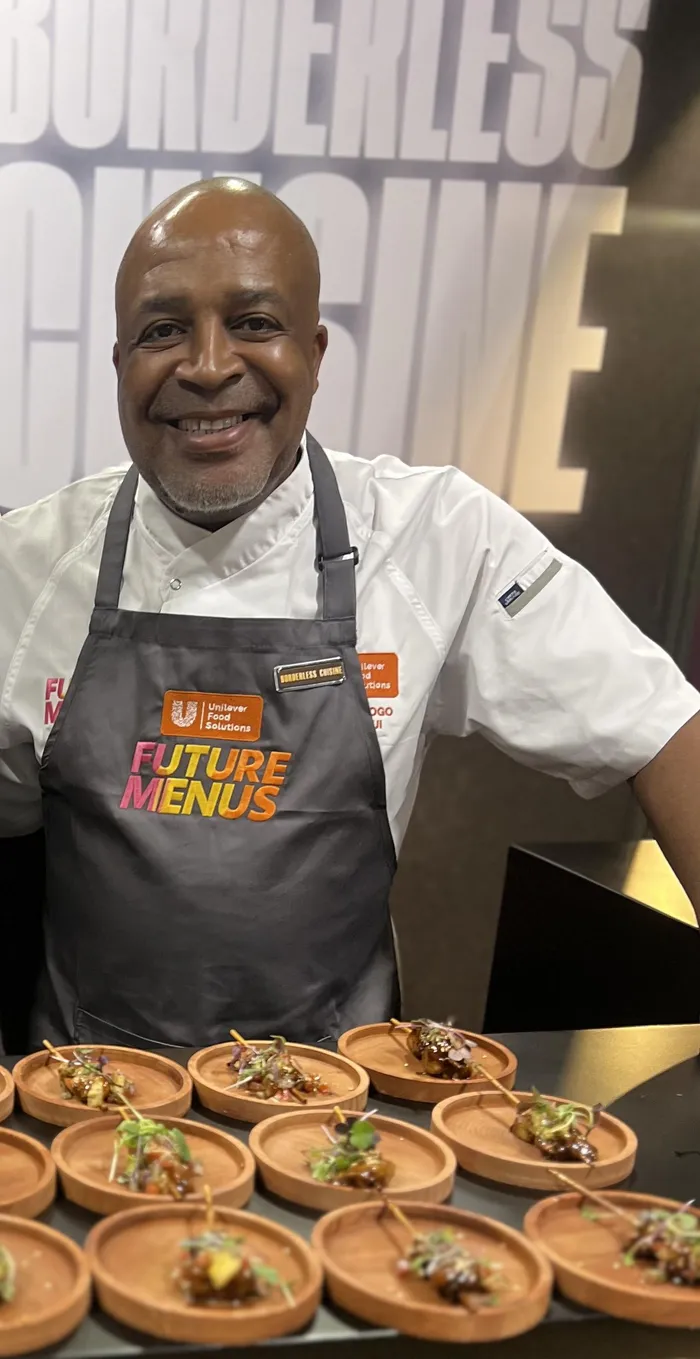Taking heat in the kitchen: Chef Tebogo Ramatsui gets candid about mental health in the food industry
MENTAL HEALTH

Chef Tebogo Ramatsui is a culinary artist whose journey exemplifies both passion and perseverance.
Image: Vuyile Madwantsi
The smell of sizzling spices. The clatter of pans. The rush of orders. To the outside world, the kitchen can seem like a place of magic filled with flavours, flair, and fiery passion.
But behind this culinary curtain, many chefs are quietly fighting a different kind of heat, one that burns out the body and mind.
As June rolls in, bringing with it Father’s Day and Men’s Mental Health Month, it’s time to pause and reflect on the often-overlooked struggles and strengths of South Africa’s vibrant culinary scene.
This month isn’t just about celebrating fathers with gifts or hearty meals; it’s about acknowledging the emotional toll that can take on men, especially those who dedicate their lives to feeding others.
And nowhere is this more apparent than in the stories of chefs like Tebogo Ramatsui, a culinary artist whose journey exemplifies both passion and perseverance.
Unpacking men’s mental health in South Africa’s food industry
Research from global organisations, such as FairKitchens, reveals a concerning reality.
• 74% of chefs report sleep deprivation to the point of exhaustion.
• 63% say they’ve suffered from depression.
• 53% feel they’ve been pushed to their breaking point.
These figures aren’t just numbers, they’re a wake-up call for South Africa, where the hospitality industry is a vital part of our economy but often at the expense of mental wellbeing.
In South Africa, long hours, high pressure, and physically demanding work are daily realities for many chefs and hospitality workers.
Taking heat in the kitchen
Add to that the reality of workplace bullying, intimidation, and sometimes hazardous conditions, and it’s no surprise that mental health issues are prevalent.
Yet, many feel they must hide their struggles, believing that admitting vulnerability is a sign of weakness.
As Father's Day approaches, Lifestyle asked Chef Ramatsui about why Men's Mental Health Month is important to him, as both a chef and a father.
“It’s been highlighted on so many platforms, the importance of looking after your mental health and speaking up when you’re facing darker days,” he says.
“A lot of people don’t have someone they can lean on. In kitchens, that ‘someone’ should be your team.”
Ramatsui’s journey has taken him from recipe development, crafting dishes around new products like smoked paprika, to mentoring chefs across Durban, Johannesburg and Cape Town. Yet nothing has shaped his outlook more than witnessing colleagues struggle in silence.
“When you bottle it up, eventually you snap,” he warns. “I’ve seen talented chefs walk away because the pressure became too much.”
When I met Chef Ramatsui at Makers Landing in Cape Town, he was there representing Unilever Food Solutions for the launched of the third volume of their Future Menus 2025 trend report - a global culinary initiative helping kitchens around the world keep pace with diners' evolving tastes.
This year’s report introduced four cutting-edge trends: Street Food Couture, Borderless Cuisine, Culinary Roots, and Diner design.
Yet, amid the buzz of food innovation, something deeper was simmering under the surface.
“Before anything else, we’re human,” Chef Ramatsui said in conversation.
“We’re sons, we’re fathers, and we carry things that people never see. You can make a perfect plate and still feel empty inside.”
Chef Ramatsui’s journey isn’t just about creating delectable dishes; it’s about reconnecting with roots and the emotional comfort that food provides.
When I spoke to him ahead of Father’s Day, his words resonated deeply: “Food is a journey, a story we tell about ourselves. When people travel, their food travels with them. It’s a celebration of our culture, our history, and our identity.”
He shared that, despite his busy schedule, one dish holds a special place in his heart, a good chicken curry.
“No matter where I go, a good curry always melts me,” he said, his voice tinged with nostalgia. For him, this dish isn’t just a meal; it’s a symbol of home, family, and memories that anchor him amid the chaos.
Mental health support in the hospitality industry
“People don’t realise how hectic the hours are,” says Chef Ramatsui. “You’re on your feet all day, carrying heavy pots, dealing with high-pressure orders, shouting, stress … and when your shift ends, life still expects you to be okay.”
Add to that, the culture of silence. For many men, especially in South Africa where stoicism is still seen as a strength, talking about mental health feels like breaking an unwritten code.
“We're told to toughen up,” he reflects. “But holding everything in? That’s what breaks you.
“Many guys think they need to be tough, to hide their feelings. But talking to someone, and sharing your struggles, can be life-changing. We need to normalise mental health conversations, especially in our industry,” said Chef Ramatsui.
In South Africa, where mental health stigma persists, these initiatives serve as lifelines. They remind us that strength isn’t just physical, it’s emotional resilience and vulnerability that foster true wellness.